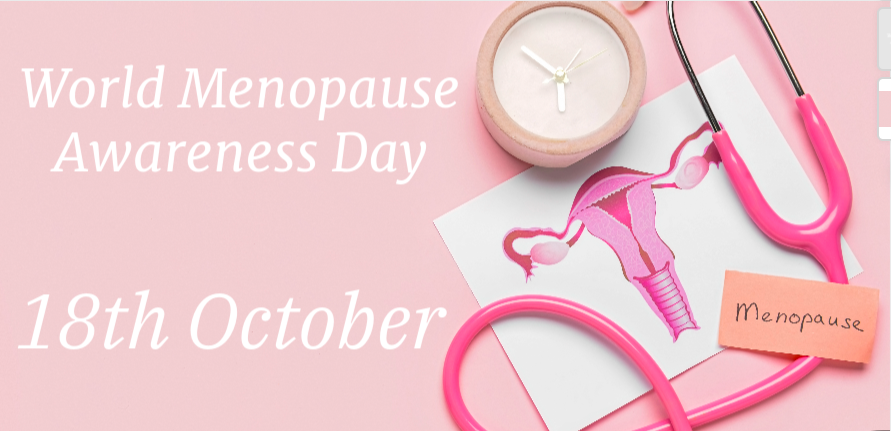The 18th October is Menopause Awareness Day, an opportunity to raise awareness and shed light on the physical and emotional effects of menopause and to promote better understanding and support for those going through this natural life transition.
Why Menopause Awareness is important:
Education: Menopause is a significant milestone in a person’s life, but it’s often misunderstood or stigmatised. Menopause Awareness Month provides an opportunity to educate people about the physical and emotional changes that occur during menopause, the different stages of menopause, and the available treatment options.
Health Promotion: It’s an opportunity to emphasise the importance of maintaining good health and well-being during and after menopause. This includes discussions about diet, exercise, bone health, and managing menopausal symptoms.
Workplace Support: Menopause Awareness Month also highlights the need for workplace support for menopausal employees. Many women experience menopausal symptoms that can affect their work performance, and creating a supportive work environment is crucial.
Tips for supporting the well-being of your menopausal employees:
Education and Training: Organisations can provide educational resources and training to both employees and managers about menopause. This can include workshops, webinars, or informational pamphlets that explain the physical and emotional aspects of menopause and its potential impact on work.
Flexible Work Arrangements: Consider offering flexible work arrangements, such as adjusted hours or remote work options, to accommodate employees who may be dealing with menopausal symptoms that affect their productivity or well-being.
Wellness Programs: Include menopause-related wellness programs in your employee wellness initiatives. This can involve yoga or mindfulness classes that help manage stress, nutrition guidance, or access to employee assistance programs.
Supportive Policies: Develop and communicate policies that explicitly address menopause-related concerns, including leave options or accommodation procedures for those experiencing severe symptoms.
Open Communication: Encourage open and empathetic communication within the organisation. Create a culture where employees feel comfortable discussing their menopausal experiences with their supervisors or HR departments without fear of discrimination.
Workplace Wellbeing Professional & Menopause
At Workplace Wellbeing Professional, we are committed to shedding light on the subject of menopause regularly, with the aim of educating and enlightening individuals not only in the UK but also around the world. Although there has been an increase in discussions about menopause in recent months, there is still much work to be done to provide adequate support for women going through this significant life transition.
Take a look at some of our recent news items below (with many more to be found under ‘menopause’ in the Topic Index):
- Online Search Patterns Reflect Rising Demand for Menopause Friendly Workplaces
- Women Mistaking Menopause for Breast Cancer – Medical Expert Urges Increased Workplace Education
- More that 8 Out of 10 Employers Believe Workplace Menopause Support is Important
Here are some recent exclusive feature articles submitted by healthcare experts (with many more to be found under ‘menopause’ in the Topic Index):
- Sally-Ann Turner: Lack of Menopause Awareness Really is a Workplace Issue
- Anna Dabek: Creating a Menopause Friendly Workplace – Legal Considerations, Training and Accreditations
- Kate Usher: Menopause, It’s a Man’s Thing
Additional Resources
Organisations across the UK and beyond are doing their bit to spread the word this Menopause Awareness Day. To help further your reading, or for additional resources, take a look at the links below:
- Lets Talk Menopause provides a selection of articles and studies to help individuals better prepare, recognise the symptoms and even understand the legal aspects: https://www.letstalkmenopause.org/further-reading
- The Lets Chat Menopause Campaign features a range of menopause women discussing their experiences, helping individuals to not feel alone during this process: https://letschatmenopause.wellbeingofwomen.org.uk/
- Champion Health provides a comprehensive employer guide to all things menopause, including downloadable free White Papers to further your reading: https://championhealth.co.uk/insights/menopause-awareness-month/
Don’t forget…
Workplace Wellbeing Professional has it’s own employer guide to help leaders and managers create positive and inclusive workspaces:
Menopause and the Workplace: The Ultimate Guide for Managers
Joanne is the editor for Workplace Wellbeing Professional and has a keen interest in promoting the safety and wellbeing of the global workforce. After earning a bachelor's degree in English literature and media studies, she taught English in China and Vietnam for two years. Before joining Work Well Pro, Joanne worked as a marketing coordinator for luxury property, where her responsibilities included blog writing, photography, and video creation.



